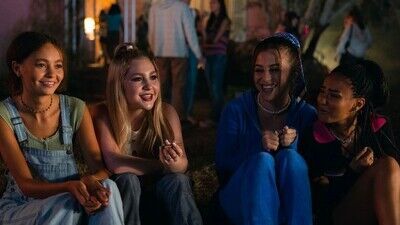Paul and Doris build a gradual, unlikely friendship, whose rhythms don’t land with authentic emotions in Chinn’s script, which lacks the depth and dimension that it requires. But Chinn is more successful elsewhere in depicting Doris’ process of coming out of her shell. Taking advantage of her mother’s frequent absences at night, she starts inviting her brand-new crew of friends over for parties and sleepovers. At first, her new friends—played by Ella Anderson, Daniella Taylor, Amarr and Ariel Martin—don’t even seem aware of Doris’ existence, an unlikely scenario given how noticeably genial she is. But her social circle grows once her home becomes her school’s party hub. Endearingly, Chinn subverts our expectations about this crew that we suspect are using Doris at first and prove that teens rise up to the occasion when duty calls. In that, Doris’ new clan of friends lend her a helping hand when she needs them the most.
But the film struggles to find its emotional core on the whole, ping-ponging amid the hospice, Doris’ new circle, Kristine’s desperation and the relationship between Paul and Doris. That last thread especially feels frustrating, with Paul too conveniently drifting in and out of the story like a ghost whenever Doris craves his outside voice of reason. You could almost watch an entire movie of its own about this friendship, or about everything else Doris is dealing with. But when piled on top of each other, Chinn only scratches the surface of the story, which ultimately falls short of its potential.
One also often wishes for something more substantial written for Kristine throughout “Suncoast.” A loving and caring mother overburdened with an impossible situation, we don’t get enough quiet moments from her to offset her understandable anger. The film also doesn’t engage with the fact that she is a white mother of a Black girl. In one of the early scenes of “Suncoast,” Doris protests when her mother asks her to ride at the back of the truck, pointing out to her natural hair as a reason. Kristine dismisses this objection with, “Your hair? Really?” It’s a scene that leaves an uncomfortable aftertaste.
